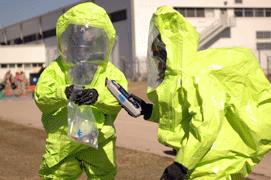COURSE OVERVIEW
HE0250 : Managing Risk, Reliability & Loss Prevention in Production Operations: Risk Assessment & Hazard Identification

OVERVIEW
| COURSE TITLE | : | HE0250 : Managing Risk, Reliability & Loss Prevention in Production Operations: Risk Assessment & Hazard Identification |
| COURSE DATE | : | Apr 06 - Apr 10 2025 |
| DURATION | : | 5 Days |
| INSTRUCTOR | : | Mr. John Taljard |
| VENUE | : | Al Khobar, KSA |
| COURSE FEE | : | $ 5500 |
| Request For Course Outline | ||
Course Description
This practical and highly-interactive course
includes real-life case studies and exercises where
participants will be engaged in a series of
interactive small groups and class workshops.
The escape of toxic methyl isocyanate vapour from the
Union Carbide India Limited plant at Bhopal in India on
December 1984 was the most serious process plant
incident in history, causing thousands of deaths and
many tens of thousands of severe injuries, many of
them causings permanent incapacity. This and the
explosion at the Phillips Petroleum polyethylene plant
at Pasadena on 23 October 1989, which killed 23
people and injured hundreds more, alerted
management and governments to the need for much
more than traditional occupational safety and health
programs to provide safety for those working in, or
living around, process plants.
Loss prevention is not only concerned with incidents
that cause injury to people. It covers all forms of loss,
including damage to the environment and property, and
interruption to production caused by major failures of a
plant, even when there is no injury to people or
damage to the surroundings. Avoidance or
minimization of the risks of all these types of incident is
embraced by the field of Industrial Plant Risk and
Reliability Management.
There are many reasons why organizations may be concerned with managing their
risks. These range from avoidance of injury or the cost of replacing damaged
equipment, to such matters as maintaining a good public image or avoiding legal
claims or prosecution of senior managers for negligence.
This course is designed to cover the latest techniques in risk management (the systematic
approach to identifying hazards, assessing the risks from each, and targeting resources to
prevent accidents), and reliability management in process plants, and production facilities.
link to course overview PDF
includes real-life case studies and exercises where
participants will be engaged in a series of
interactive small groups and class workshops.
The escape of toxic methyl isocyanate vapour from the
Union Carbide India Limited plant at Bhopal in India on
December 1984 was the most serious process plant
incident in history, causing thousands of deaths and
many tens of thousands of severe injuries, many of
them causings permanent incapacity. This and the
explosion at the Phillips Petroleum polyethylene plant
at Pasadena on 23 October 1989, which killed 23
people and injured hundreds more, alerted
management and governments to the need for much
more than traditional occupational safety and health
programs to provide safety for those working in, or
living around, process plants.
Loss prevention is not only concerned with incidents
that cause injury to people. It covers all forms of loss,
including damage to the environment and property, and
interruption to production caused by major failures of a
plant, even when there is no injury to people or
damage to the surroundings. Avoidance or
minimization of the risks of all these types of incident is
embraced by the field of Industrial Plant Risk and
Reliability Management.
There are many reasons why organizations may be concerned with managing their
risks. These range from avoidance of injury or the cost of replacing damaged
equipment, to such matters as maintaining a good public image or avoiding legal
claims or prosecution of senior managers for negligence.
This course is designed to cover the latest techniques in risk management (the systematic
approach to identifying hazards, assessing the risks from each, and targeting resources to
prevent accidents), and reliability management in process plants, and production facilities.
TRAINING METHODOLOGY
This interactive training course includes the following training methodologies:
LecturesPractical Workshops & Work Presentations
Hands-on Practical Exercises & Case Studies
Simulators (Hardware & Software) & Videos
In an unlikely event, the course instructor may modify the above training methodology for technical reasons.
VIRTUAL TRAINING (IF APPLICABLE)
If this course is delivered online as a Virtual Training, the following limitations will be applicable:
| Certificates | : | Only soft copy certificates will be issued |
| Training Materials | : | Only soft copy materials will be issued |
| Training Methodology | : | 80% theory, 20% practical |
| Training Program | : | 4 hours per day, from 09:30 to 13:30 |
RELATED COURSES

HE0628 : Food Handler Certification for Food Service Worker (FSE)
- Date: Apr 07 - Apr 11 / 3 Days
- Location: Abu Dhabi, UAE
- Course Details Register

HE0257 : Carry out Work Handovers (HSE Critical)
- Date: Apr 07 - Apr 11 / 3 Days
- Location: Abu Dhabi, UAE
- Course Details Register

HE0629 : Food Safety Certification for Managers, Chefs and Supervisors
- Date: Apr 07 - Apr 11 / 3 Days
- Location: Abu Dhabi, UAE
- Course Details Register

HE0126 : Occupational Hygiene Certification Program: OHTA501: Measurement of Hazardous Substances (Accredited by the Occupational Hygiene Training Association - OHTA)
- Date: Apr 07 - Apr 11 / 3 Days
- Location: Abu Dhabi, UAE
- Course Details Register
